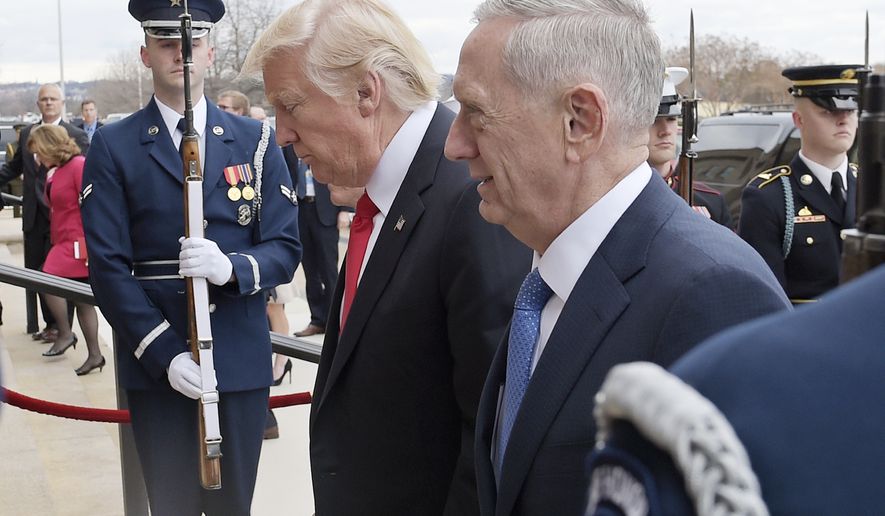The Pentagon has been stripped of almost all of its political appointees from the Obama administration, but an uncertain Senate future awaits the candidates whom President Trump will nominate to remake the armed forces in his image.
Of Mr. Obama’s 163 political appointees at election time, who included Senate-confirmed service secretaries, undersecretaries and assistant secretaries, only 16 remain at the Defense Department, according to a Pentagon statement to The Washington Times.
The exodus might be considered normal in the transfer of power: Political appointees are required to turn in their resignations in December.
But Washington’s bitter political climate is far different today from the last transfer of power in 2009. Senate Democrats are resisting Mr. Trump and his agenda via the confirmation process. There is a chance that some of the Defense Department’s 53 appointed positions requiring Senate confirmation will be vacant for a long time.
The vacancies give Mr. Trump an opportunity to select men and women who will provide the leadership, policies and catalyst for his two main priorities: rebuilding the military and defeating the Islamic State terrorist group.
“I imagine DOD cares more about getting people on board than what a nominee’s vote count is,” said James Carafano, who directs foreign policy studies at The Heritage Foundation. “If Congress is just going to partisan split all the votes, it won’t damage the appointees in their relations with Congress because the votes don’t really reflect anything about the nomination. DOD has to get down to the business of rebuilding the military. They don’t have time for political posturing by factions in Congress that are upset about how the American people voted.”
Retired Air Force Lt. Gen. Thomas McInerney said the Trump team has been wise in giving a cold shoulder to the “NeverTrump” advocates in the Republican Party.
“Loyalty to the president, especially one who was as courageous as President Trump on his position against radical Islam, is important,” Mr. McInerney said.
The four Senate-approved appointees still on the job: Deputy Defense Secretary Bob Work and three officials serving as active secretaries of the Navy, Air Force and Army.
The 163 political appointees account for a smidgen of the Pentagon’s 25,000 employees, yet can, in the case of President Obama, drive the ship. They developed polices that led to openly gay troops, women in direct land combat, a new war in Iraq and climate change as a national security threat.
Senate Democrats did fast-track confirmation of Defense Secretary James N. Mattis, a retired four-star Marine Corps general widely respected on both sides of the aisle.
“President Trump and Secretary Mattis need their team to be in place,” said Jim Dolbow, a former Republican Senate defense aide. “I would advise Democrats to be more like the late Sen. Henry “Scoop” Jackson, who put his country first instead of resorting to politics of personal destruction and delaying tactics.”
At his confirmation hearing, Mr. Mattis made broad strokes on policy. For example, he testified that he has no plans to revoke the policy on women in combat. If someone tells him there is a problem, he will look at it, he said. On the Iran nuclear deal, he said, the U.S. had given its word.
’People are policy’
Both parties have histories of blocking nominees on tangential issues, such as a dispute with the White House or a government department. The “hold” is a perfect example of the power that one lone senator can exert.
Sen. Pat Roberts, Kansas Republican, last spring blocked a vote on the nomination of Eric Fanning as Army secretary, not because of Mr. Fanning but because of Mr. Obama’s handling of terrorist detainees at the military detention center at Guantanamo Bay, Cuba.
“I will be more than happy to vote for Mr. Fanning once the White House addresses my concerns regarding the president’s efforts to move Guantanamo Bay terrorist detainees to the mainland with Fort Leavenworth, Kansas, the intellectual center of the Army, very high on the list,” Mr. Roberts said.
Mr. Fanning eventually got the job and was one of the Senate-confirmed appointees who left the Pentagon around the time Mr. Trump was sworn in.
In his third week, Mr. Trump has only one Senate-confirmed Pentagon official in place: Mr. Mattis.
In 2008, the Pentagon put out the figure of 250 political appointees, a larger number than the one provided to The Times this week. A spokesman said there is no set number and some jobs go vacant.
Mr. Obama kept more than 150 of President George W. Bush’s political appointees in 2009, including Mr. Bush’s defense secretary, Robert M. Gates, who wanted them all to stay.
Mr. Trump has picked what appears to be establishment types, not conservative revolutionaries, for Navy secretary (venture capitalist and former Army officer Philip Bilden) and for Air Force secretary (former Rep. Heather Wilson of New Mexico, an Air Force Academy graduate).
His pick for Army secretary, billionaire Wall Street trader Vincent Viola, withdrew his nomination because reconciling his extensive business ties with conflict-of-interest rules became unworkable.
Mr. Mattis’ ruling roundtable will be the Defense Department’s five undersecretaries for acquisition, budget, intelligence, personnel and policy.
Below them are key appointments for assistant secretaries for policies on Asia, Europe and the Middle East, as well as for the top civilian for special operations forces.
“People are policy,” said Elaine Donnelly, who directs the Center for Military Readiness. “President Trump and Defense Secretary James Mattis will not be able to strengthen our military and improve readiness unless they replace Obama-era holdovers with people who will end political correctness in the military.”
Mrs. Donnelly believes Mr. Obama shifted the Pentagon emphasis to his social agenda and political correctness at the expense of readiness.
Listing senior posts, she said, “All of these positions should be filled by qualified people who share Secretary Mattis’ stated paramount goal: mission readiness and lethality in battle.”
• Rowan Scarborough can be reached at rscarborough@washingtontimes.com.




Please read our comment policy before commenting.